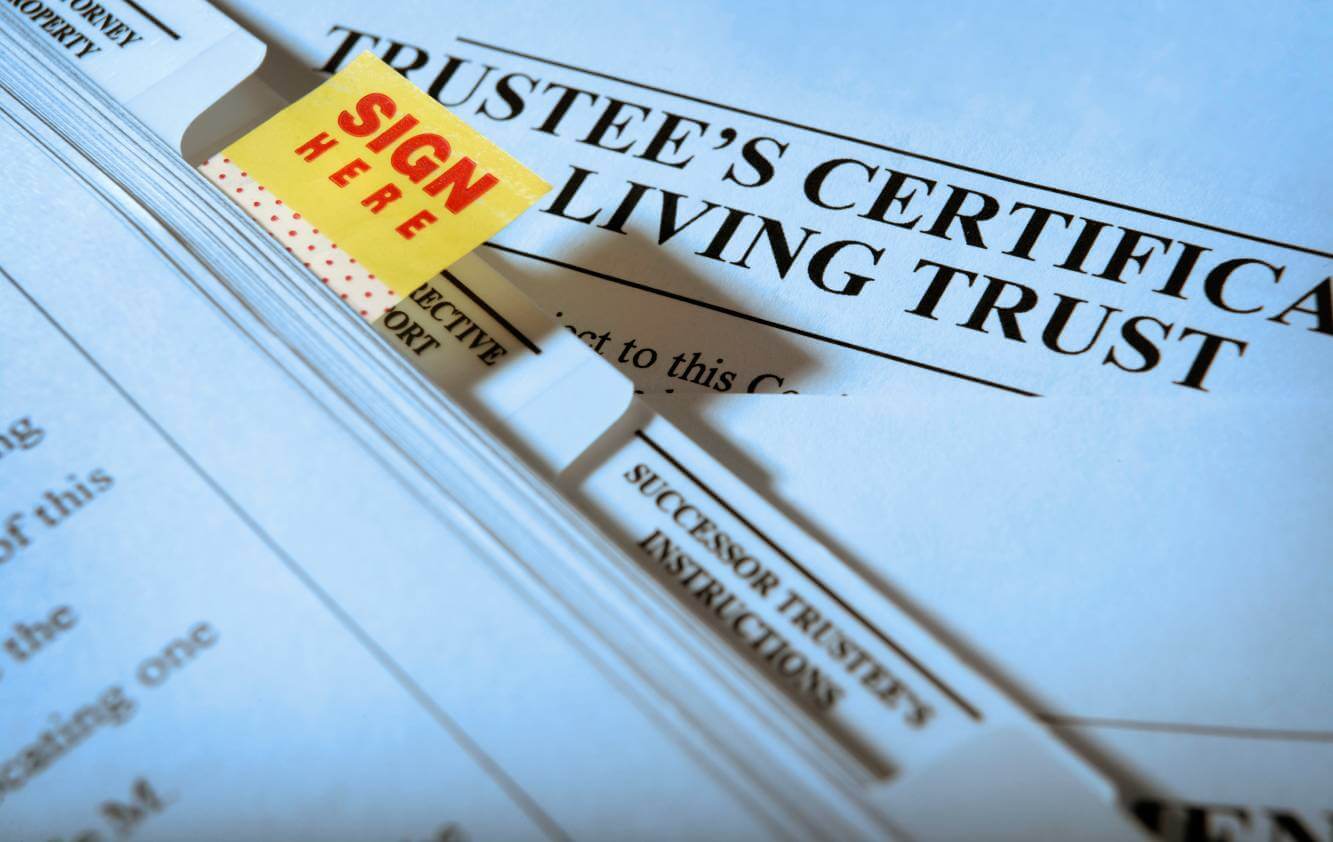Can a Trustee Sell Trust Property Without All Beneficiaries Approving?

Whether you are creating a trust or taking on responsibility as the trustee, you need to know the ins and outs of this important role. A trustee has critical duties to perform and obligations to adhere to. One of these obligations is to protect the property of the person who has created the trust.
While a trustee can sell trust property without full beneficiary approval, this privilege depends on the specific terms outlined in the trust document. This authority stems from the trustee's fiduciary role and the powers granted by the trust itself, not from beneficiary consensus.
Understanding this distinction is crucial for both trustees and beneficiaries navigating trust administration. A trust is a legal arrangement where one party (the trustee) holds and manages assets for the benefit of others (the beneficiaries). The key difference between revocable and irrevocable trusts also affects this process, with revocable trusts typically offering more flexibility for property sales.

Understanding the trustee's authority
Setting clear expectations about trustee powers helps beneficiaries understand why consent isn't always required for property sales.
What is a trustee and what powers do they have?
According to Craig Tarpinian, LegalShield provider lawyer with Powers Chapman in Michigan, "A trustee is a fiduciary who carries out the provisions that are spelled out in a Trust document."
Trustees are not simply asset managers—they're legal fiduciaries with specific authority derived from the trust document itself. The answer to, “Can a trustee sell property?” depends entirely on what powers the trust grants them, not on family dynamics or beneficiary preferences.
The trust document typically outlines whether the trustee has:
- Absolute discretion to manage or dispose of trust property
- Limited authority requiring specific conditions
- Broad investment powers including real estate transactions
Fiduciary duty and legal boundaries
Trustees must operate within strict legal boundaries while exercising their authority. Tarpinian explains that trustees must "Keep the heirs notified of the trust process and keep them informed of their powers and duties."
Key fiduciary obligations include:
- Acting in beneficiaries' best interests at all times
- Avoiding conflicts of interest and self-dealing
- Following trust terms exactly as written
- Maintaining transparency with regular communications
So can a trustee sell trust property? These legal limits ensure that while trustees can make independent decisions about the sale of trust property, they cannot act arbitrarily or for personal gain.

When can a trustee sell property without consent?
If you are wondering, “Can a trustee sell property without all beneficiaries approving?”, the answer can be complex. This decision lies primarily in the trust document's specific language.
The role of the trust document
Most trust agreements contain language that either grants or restricts the trustee's ability to sell property. Common phrases include:
- "The Trustee shall have absolute discretion to manage or dispose of trust property."
- "Real estate may be sold when necessary for trust administration."
- "Property sales require majority beneficiary consent."
However, Tarpinian notes that "It would be recommended if there is going to be a problem with consent, then Trustee may need to seek Court permission to sell property."
Revocable vs irrevocable trusts
Here’s a common question that you may be asking: Can a trustee sell property in an irrevocable trust? Understanding this requires recognizing the differences between trust types:
Revocable trusts generally provide more flexibility for property sales since the grantor retains control during their lifetime.
Irrevocable trusts often have more restrictive terms, but trustees can still sell property if the trust document grants this authority.
Successor trustees and sale of property
When discussing successor trustee sale scenarios, it's important to know that successor trustees typically inherit the same powers as the original trustee. They step into the role with identical authority and responsibilities outlined in the trust document.

Do all beneficiaries have to agree?
The short answer is usually no, provided the trustee has proper authority under the trust terms.
Beneficiary rights vs trustee powers
Tarpinian emphasizes the balance: "Both are important. A Trustee is a fiduciary and must keep beneficiaries informed and properly carry out the duties as Trustee. The Beneficiary can object to the work done by a trustee and ask for an accounting and can always seek court remedies."
This means while trustees can often act independently, beneficiaries retain important rights:
- Right to information about trust administration
- Right to challenge decisions that breach fiduciary duty
- Right to seek court supervision when necessary
Can a trustee be stopped from selling?
Beneficiaries may successfully prevent a property sale in these situations:
- Breach of fiduciary duty by the trustee
- Conflict of interest or self-dealing
- Violation of trust terms or state law
- Lack of proper authority in the trust document

Common legal scenarios and misconceptions
Many people confuse trustees with executors and administrators, leading to misunderstandings about property sale authority.
Can an executor or administrator sell property without consent?
The questions can executor sell property without all beneficiaries approving and can administrator sell property without all beneficiaries approving involve different legal frameworks:
- Executors manage estate assets under a Will.
- Administrators handle estates without Wills.
- Trustees manage trust assets under trust documents.
Each role operates under different rules and documents, though similar principles about fiduciary duty apply.
Can a trustee sell trust property to himself?
Regarding can a trustee sell trust property to himself, Tarpinian is clear: "A Trustee must avoid self-dealing."
Self-dealing is typically prohibited because it creates inherent conflicts of interest. Such transactions can lead to:
- Legal action against the trustee
- Trustee removal by the court
- Transaction reversal and damages
Can a trustee force a sale of property?
The question often arises when beneficiaries emotionally oppose selling family property. Trustees may need to liquidate real estate for:
- Paying trust debts and expenses
- Equalizing distributions among beneficiaries
- Following trust liquidation requirements
- Meeting income distribution obligations
Protecting beneficiary rights
Beneficiaries aren't powerless even when trustees have broad authority over property sales.
How beneficiaries can monitor trustee actions
Proactive beneficiaries should:
- Review the trust document thoroughly to understand trustee powers.
- Request regular accountings showing trust income, expenses, and transactions.
- Ask questions about planned property sales and their reasoning.
- Stay informed about trust administration progress.
What to do if you suspect trustee misconduct
Tarpinian advises: "A beneficiary should be informed and ask questions of the trustee. If there are problems the beneficiary can ask for accountings and see court supervision."
Warning signs of potential misconduct include:
- Hidden information about trust assets or transactions
- Personal profit from trust property sales
- Unexplained delays in distributions or communications
- Conflicts of interest in property transactions
Available remedies include mediation, court petitions, and trustee removal proceedings.
When legal help may be necessary
Trust law complexity often requires professional guidance to protect everyone's interests.
When to consult an estate attorney
Legal counsel becomes valuable when facing:
- Unclear trust terms about property sale authority
- Potential conflicts between trustees and beneficiaries
- Suspected breaches of fiduciary duty
- Complex property transactions with tax implications
Estate law varies significantly by state, making professional advice crucial for avoiding costly mistakes.

Litigation risks and costs
Tarpinian warns that "Legal fees can be very expensive in reviewing and challenging the work of the Trustee."
Trust litigation involves:
- Extended timelines often lasting months or years
- Substantial legal costs for all parties
- Uncertain outcomes depending on trust terms and evidence
- Potential damage to family relationships
How LegalShield can help with trust matters
Navigating trust administration and property sales doesn't have to be overwhelming. LegalShield Members have access to experienced provider law firms that can assist with:
- Document review of trust agreements and property sale documents
- Legal consultations to understand trustee and beneficiary rights
- Unlimited legal questions about trust administration
- Professional guidance on fiduciary duties and obligations
Whether you're a trustee needing clarity on your authority or a beneficiary concerned about property sales, LegalShield's network of qualified attorneys can provide the legal support you need. Visit LegalShield's estate planning and real estate pages to learn more about available legal services.
Know your rights: Trustees can sell, but not without limits
Trustees can sell trust property if the trust document allows it, even without beneficiary consent. However, they must always act within their fiduciary duties and follow proper legal procedures.
The key is understanding what the trust document actually says about property sales and ensuring all parties know their rights and responsibilities. When in doubt, seeking qualified legal advice can prevent misunderstandings and protect everyone's interests in the trust administration process.
Remember: trustee authority comes from the trust document, not from beneficiary approval, but this power isn't unlimited and must always serve the beneficiaries' best interests.
________________________________________________________________
Mr. Tarpinian was born in Detroit, Michigan. He received his Bachelor of Arts Degree from Michigan State University in East Lansing, Michigan. He received his Juris Doctorate from the Thomas Cooley Law School in Lansing.
Trusts and estates can be complex and confusing.
LegalShield can help!
LegalShield is a trademark of Pre-Paid Legal Services, Inc. (“LegalShield”). LegalShield provides this blog as a public service and for general information only. The information made available in this blog is meant to provide general information and is not intended to provide legal advice, render an opinion, or provide a recommendation as to a specific matter. The blog post is not a substitute for competent legal counsel from a licensed professional lawyer in the state or province where your legal issues exist, and you should seek legal counsel for your specific legal matter. All information by authors is accepted in good faith. However, LegalShield makes no representation or warranty of any kind, express or implied, regarding the accuracy, adequacy, validity, reliability, availability, or completeness of such information. The materials contained herein are not regularly updated and may not reflect the most current legal information. No person should either act or refrain from acting on the basis of anything contained on this website. Nothing on this blog is meant to, or does, create an attorney-client relationship with any reader or user. An attorney-client relationship may be formed only after the execution of an engagement letter with an attorney and after that attorney has confirmed that no conflicts of interest exist. Nothing on this website, or information contained or transmitted by this website, is intended to be an advertisement or solicitation. Information contained in the blog may be provided by authors who could be a third-party paid contributor. LegalShield provides access to legal services offered by a network of provider law firms to LegalShield members through membership-based participation. LegalShield is not a law firm, and its officers, employees or sales associates do not directly or indirectly provide legal services, representation, or advice.



